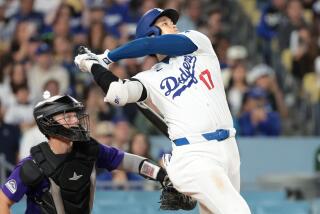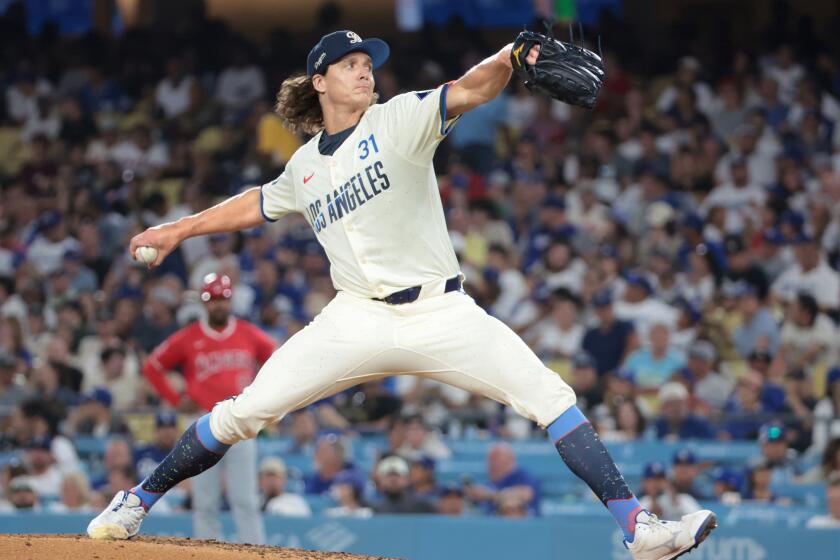Dodgers’ attendance isn’t always what it seems
The Dodgers attract fewer fans to their stadium than they did three decades ago.
And, despite three trips to the playoffs in the last four years, one in five tickets has gone unused in that time.
The attendance figures, part of a court filing in the divorce between Dodgers owner Frank McCourt and his estranged wife, Jamie, provide rare insight into a question Major League Baseball hasn’t answered in 17 years: How many people attend games?
In 1993, in consolidating business operations between the National League and American League, MLB standardized the definition of attendance as tickets sold, not tickets used. The NL clubs, including the Dodgers, previously had announced the turnstile count.
The Dodgers drew a record 3.6 million fans in 1982, one year after beating the New York Yankees for the World Series championship. The Dodgers have surpassed that mark in each of the last four years under the MLB definition of attendance.
However, the court filing revealed the Dodgers’ turnstile count last year was 3.11 million, the high in the McCourt era. The Dodgers exceeded that figure seven times from 1978-91, including four consecutive years from 1982-85, before the NL clubs started counting unused tickets in their attendance.
Dodgers spokesman Josh Rawitch declined to make club President Dennis Mannion available to comment on the topic.
Andy Dolich, a Bay Area sports consultant with executive experience in each of the four major North American sports leagues, said no one factor could explain why the Dodgers draw fewer fans today.
“There’s a gumbo of issues facing the Dodgers,” said Dolich, a former marketing boss with the Oakland Athletics and most recently chief operating officer of the San Francisco 49ers.
Dolich pointed in part to the recession, to fans out of work or otherwise needing to cut their expenses.
As the Los Angeles population has grown, so has the variety of entertainment options, said David Carter, executive director of the USC Sports Business Institute.
Staples Center, the Honda Center, Home Depot Center, and the LA Live and Hollywood and Highland complexes are among the venues that have opened since the days of Garvey, Lopes, Russell and Cey.
And, in that era, the Angels did not win consistently or promote themselves.
“They’ve definitely taken a bite out of the Dodgers,” Dolich said.
The renaissance of cozy ballparks and the rise of the secondary ticket market — think Stub Hub — also has hurt the Dodgers, according to Paul Swangard, managing director of the Warsaw Sports Marketing Center at the University of Oregon.
The San Diego Padres and San Francisco Giants have downsized into baseball-only parks, and the Angels yanked out 20,000 seats in renovating their stadium in the ‘90s. With the New York Yankees moving into a new ballpark, Dodger Stadium is the largest in the major leagues, with 56,000 seats.
“You want to have these smaller ballparks to create scarcity,” Swangard said. “There is no scarcity in L.A.
“With all the inventory floating around, why be a season-ticket holder?”
The plethora of seats available for sale — and resale — compelled the Dodgers to offer significant discounts, including 60% off on selected tickets for Saturday’s game against the popular New York Mets. In turn, experts say, discounted tickets are less likely to be used.
Dolich said the average major league team has a no-show rate in the range of 15% to 20%. Swangard said the Dodgers’ 20% rate over the last four years was on the high side “but not terribly abnormal.”
The Angels would not comment for this story. In a previous story, they reported their no-show rate at 19% for the 2004 season, ranging from 4% for a playoff game to 40% for a Tuesday afternoon game in April, when school and work commitments made it difficult for fans to sell or give away unwanted tickets.
Rawitch said the Dodgers’ no-show rate “has remained steady for many years.” He declined to say whether that rate has increased this season.
Every fan who does not use a ticket is a fan to whom the Dodgers cannot sell a $5 Dodger Dog or $5 bottle of water or a nightly parking space for $15. “People showing up as empty seats means you’re losing significant revenue, which you could plow back into the development of your team in some way,” Dolich said.
The sizable discounts raise the issue of whether the regular ticket prices might be too high.
“There’s no question price is always a factor,” Dolich said.
The Dodgers froze their ticket prices in 2009, but they raised the average ticket price by 75% from 2004 to 2008, the first five years of McCourt ownership, according to Team Marketing Report. The price of the average major league ticket rose 28% in that time.
In 2004, the Dodgers’ average price of $16.92 ranked 20th. In 2008, the Dodgers’ average price of $29.66 ranked sixth.
Upon their arrival in 2004, the McCourts set an attendance goal of 4 million. The greatest number of tickets sold since then was 3.86 million in 2007.
The Dodgers lost 14% of their season-ticket base in two years, according to court documents, falling from 26,941 in 2007 to 23,300 in 2009. Rawitch declined to say how many season tickets the Dodgers have sold this season.
The Dodgers still led the major leagues by selling 3.76 million tickets last season. They are on pace to sell 3.65 million tickets this season, based on the average through Wednesday’s game, which would be the lowest such figure since 2005 and would rank third in the majors, behind the Yankees and Philadelphia Phillies.
As to the previous goal of selling 4 million tickets, the Dodgers already did it. In 1982, when the NL did not count unused tickets in attendance, the Dodgers sold 4 million, said Barry Stockhamer, former vice president of marketing.
In 1992, the Toronto Blue Jays were feted as the first major league team to sell 4 million tickets.
“When the Blue Jays were the first club to announce 4 million, many of us would reflect that the milestone had already been passed by the Dodgers,” Stockhamer said. “It didn’t diminish the accomplishment.”
Clicking on Green Links will take you to a third-party e-commerce site. These sites are not operated by the Los Angeles Times. The Times Editorial staff is not involved in any way with Green Links or with these third-party sites.
More to Read
Are you a true-blue fan?
Get our Dodgers Dugout newsletter for insights, news and much more.
You may occasionally receive promotional content from the Los Angeles Times.










